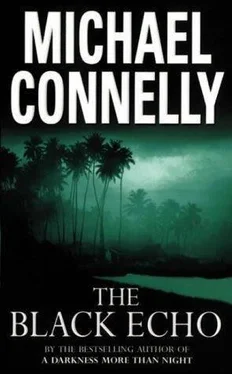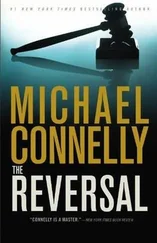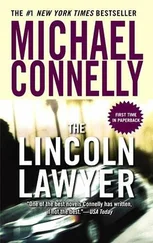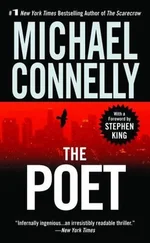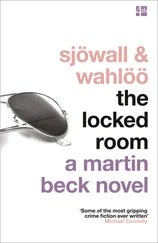Before leaving, Bosch had called Meadows’s parole officer, Daryl Slater, and was given a rundown on Charlie Company. Slater said the place was a vegetable farm owned and operated by an army colonel who was retired and born again. He contracted with the state and federal prisons to take early release cases, the only requirement being that they be Vietnam combat veterans. That wasn’t too difficult a bill to fill, Slater said. As in every other state in the country, the prisons in California had high populations of Vietnam vets. Gordon Scales, the former colonel, didn’t care what crimes the vets had been convicted of, Slater said. He just wanted to set them right again. The place had a staff of three, including Scales, and held no more than twenty-four men at a time. The average stay was nine months. They worked the vegetable fields from six to three, stopping only for lunch at noon. After the work day there was an hour-long session called soul talk, then dinner and TV. Another hour of religion before lights-out. Slater said Scales used his connections in the community to place the vets in jobs when they were ready for the outside world. In six years, Charlie Company had a recidivist record of only 11 percent. A figure so enviable that Scales got a favorable mention in a speech by the president during his last campaign swing through the state.
“The man’s a hero,” Slater said. “And not ’cause of the war. For what he did after. When you get a place like that, moving maybe thirty, forty cons through it a year, and only one in ten gets his ass in a jam again, then you are talking about a major success. Scales, he has the ear of the federal and state parole boards and half the wardens in this state.”
“Does that mean he gets to pick who goes to Charlie Company?” Bosch asked.
“Maybe not pick, but give final approval to, yes,” the PO said. “But the word on this guy is out. His name is known in every and any cellblock where you got a vet doing time. These guys come to him. They send letters, send Bibles, make phone calls, have lawyers get in contact. All to get Scales to sponsor them.”
“Is that how Meadows got there?”
“Far as I know. He was already heading there when he was assigned to me. You’d have to call Terminal Island and have them check their files. Or talk to Scales.”
Bosch filled Wish in on the conversation while they were on the road. Otherwise, it was a long ride and there were long periods of silence. Bosch spent much of the time wondering about the night before. Her visit. Why had she come? After they crossed into Ventura County his mind came back to the case, and he asked her some of the questions he had come up with the night before while reviewing the files.
“Why didn’t they hit the main vault? At WestLand there were two vaults. Safe-deposit and then the bank’s main vault, for the cash and the tellers’ boxes. The crime scene reports said the design of both vaults was the same. The safe-deposit vault was bigger but the armoring in the floor was the same. So it would seem that Meadows and his partners could just as easily have tunneled to the main vault, gotten in and taken whatever was there and gotten out. No need to risk spending a whole weekend inside. No need to pry open safe-deposit boxes either.”
“Maybe they didn’t know they were the same. Maybe they assumed the main vault would be tougher.”
“But we are assuming they had some knowledge of the safe-deposit vault’s structure before they started on this. Why didn’t they have the same knowledge of the other vault?”
“They couldn’t recon the main vault. It’s not open to the public. But we think one of them rented a box in the safe-deposit vault and went in to check it out. Used a phony name, of course. But, see, they could check out one vault and not the other. Maybe that’s why.”
Bosch nodded and said, “How much was in the main vault?”
“Don’t know offhand. It should have been in the reports I gave you. If not, it’s in the other files back at the bureau.”
“More, though. Right? There was more cash in the main vault than what, the two or three million in property they got from the boxes.”
“I think that is probably right.”
“See what I’m saying? If they had hit the main vault the stuff would have been laying around in stacks and bags. Right there for the taking. It would have been easier. There probably would have been more money for less trouble.”
“But, Harry, we know that from hindsight. Who knows what they knew going in? Maybe they thought there was more in the boxes. They gambled and lost.”
“Or maybe they won.”
She looked over at him.
“Maybe there was something there in the boxes that we don’t even know about. That nobody reported missing. Something that made the safe-deposit vault the better target. Made it worth more than the main vault.”
“If you’re thinking drugs, the answer is no. We thought of that. We had the DEA bring around one of their dogs and he went through the broken boxes. Nothing. No trace of drugs. He then sniffed around the boxes the thieves hadn’t gotten to and he got one hit. On one of the small ones.”
She laughed for a moment and said, “So then we drilled this box the dog went nuts over and found five grams of coke in a bag. This poor guy who kept his coke stash at the bank got busted just because somebody happened to tunnel into the same vault.”
Wish laughed again, but it seemed to be a little forced to Bosch. The story wasn’t that funny. “Anyway,” she said, “the case against the guy was kicked by an assistant U.S. attorney because he said it was a bad search. We violated the guy when we drilled his box without a warrant.”
Bosch exited the freeway into the town of Ventura and headed north. “I still like the drug angle, despite the dog,” he said after a quarter hour of silence. “They aren’t infallible, those dogs. If the stuff was packed in there right and the thieves got it, there may not have been a trace. A couple of those boxes with coke in them and the caper starts being worth their while.”
“Your next question will be about the customer lists, right?” she said.
“Right.”
“Well, we did a lot of work on that. We checked everybody, right down to tracing purchases of things they said were in the boxes. We didn’t find who did the job, but we probably saved the bank’s insurance companies a couple million in paying for things that were reported stolen but never really existed.”
He pulled into a gas station so he could take out a map book from under the seat and figure out the way to Charlie Company. She continued to defend the FBI investigation.
“The DEA looked at every name on the boxholder list and drew a blank. We ran the names through NCIC. We got a few hits but nothing serious, mostly old stuff.” She gave another one of those short fake laughs. “One of the holders of one of the bigger boxes had a kiddy porn conviction from the seventies. Served a deuce at Soledad. Anyway, after the bank job he was contacted and he reported nothing was taken, said he had recently emptied his box. But they say these pedophiles can never part with their stuff, their photos and films, even letters written about kids. And there was no record at the bank of him going into the box in the two months before the burglary. So we figured that the box was for his collection. But, anyway, that had nothing to do with the job. Nothing we turned up did.”
Bosch found the way on the map and pulled out of the service station. Charlie Company was in grove country. He thought about her story about the pedophile. Something about it bothered him. He rolled it around in his head but couldn’t get to it. He let it drift and went on to another question.
“Why was nothing ever recovered? All that jewelry and bonds and stocks, and nothing ever turns up except for a single bracelet. Not even any of the other worthless things that were taken.”
Читать дальше
